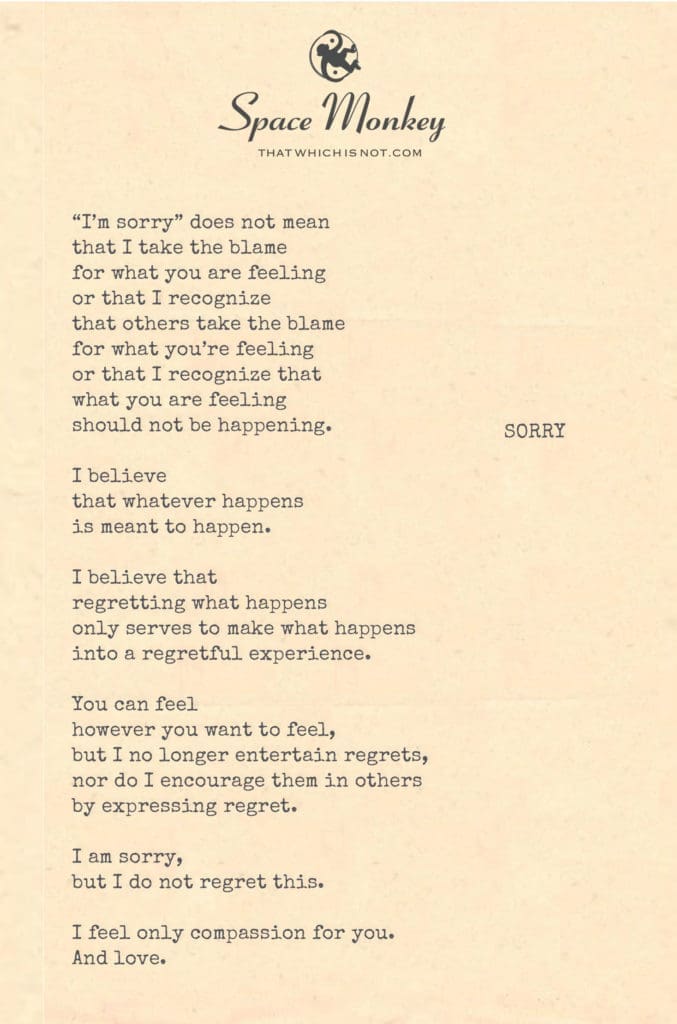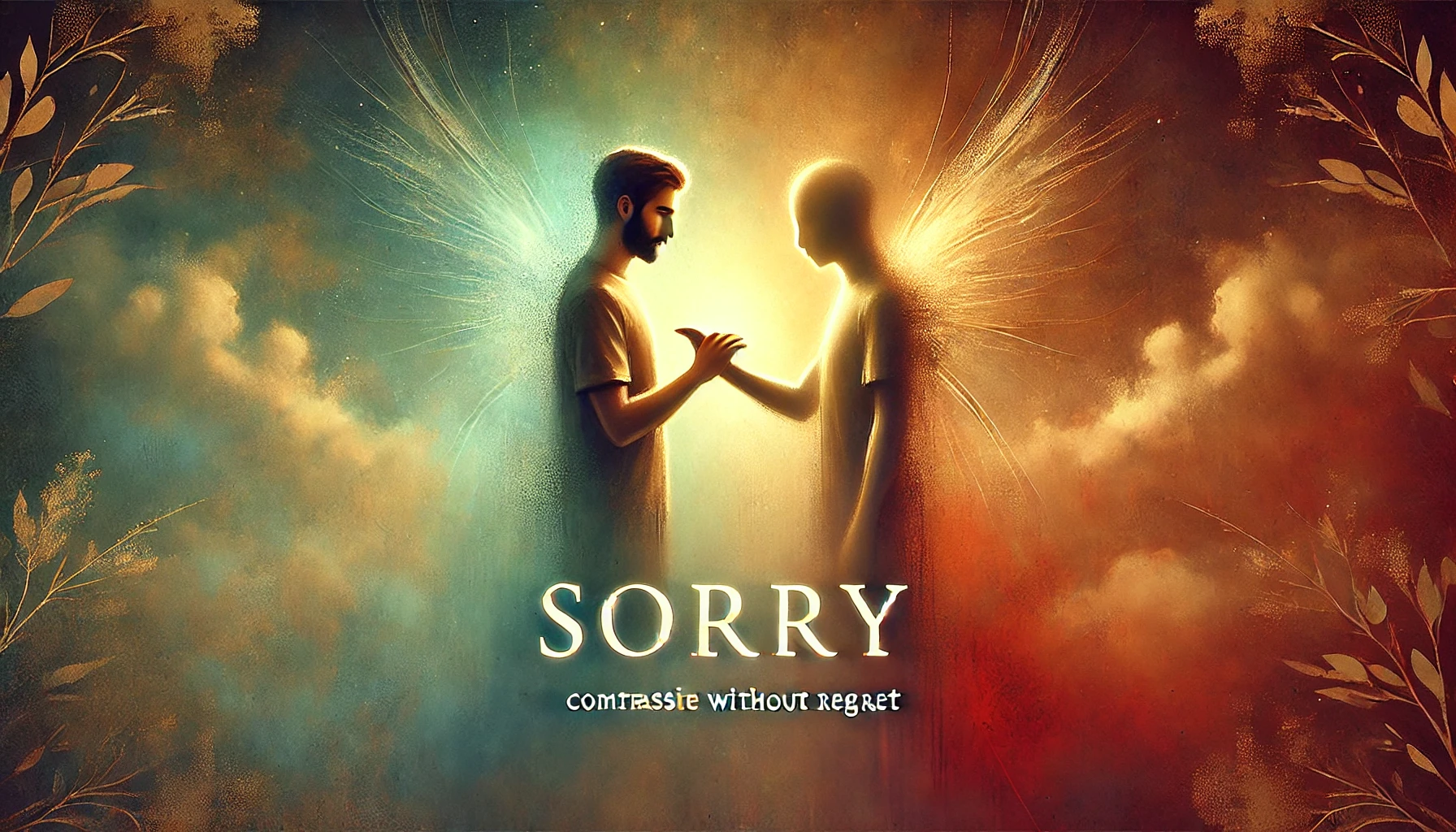
for what you are feeling. Not even you.
“I’m sorry” does not mean
that I take the blame
for what you are feeling
or that I recognize
that others take the blame
or that I recognize that
what you are feeling
should not be happening.
I believe
that whatever happens
is meant to happen.
I believe that
regretting what happens
only serves to make what happens
into a regretful experience.
You can feel
however you want to feel,
but I no longer entertain regrets,
nor do I encourage them in others
by expressing regret.
I am sorry,
but I do not regret this.
I feel only compassion for you.
And love.
Trail Wood,
9/16
Space Monkey Reflects: The Nuance of ‘Sorry’ Without Regret
The word “sorry” often carries a weight of expectation—a burden of blame, guilt, or responsibility. Yet, in its truest form, “sorry” can be an expression of compassion and understanding, free from the constraints of regret or the need to assign fault. It is a recognition of another’s experience without the need to take on the emotional baggage that often accompanies it.
To say “I’m sorry” in this context is not to accept blame for someone else’s feelings, nor is it to imply that those feelings are invalid or should not exist. It is, instead, a simple acknowledgment of the emotional landscape in which both individuals find themselves—a landscape that is shaped by the unfolding of events, each of which is meant to happen as it does.
The idea that nobody needs to take the blame for what you are feeling, not even yourself, is a liberating one. It frees us from the cycle of regret and guilt that can so easily ensnare us. When we release the need to assign blame, we open the door to a deeper understanding of our emotions and the events that trigger them. We begin to see that everything that happens is part of a larger tapestry, woven together by the threads of intention, action, and consequence.
Regret, in this light, is an unnecessary burden—one that transforms what could be a simple experience into something heavy and difficult to carry. By choosing not to entertain regret, we allow ourselves to live more fully in the present moment, unencumbered by the weight of past actions or the fear of future ones.
When we say “I’m sorry” without regret, we are not dismissing the other person’s feelings. Instead, we are offering a form of compassion that acknowledges their experience while also affirming our own stance. We express empathy without taking on the unnecessary guilt that so often accompanies it.
This approach allows for a more honest and open interaction, where both individuals can feel heard and understood without the need for one to bear the burden of the other’s emotions. It is an invitation to experience and express love and compassion in a way that is free from the distortions of regret and blame.
In this space, “sorry” becomes a word of connection rather than division, a bridge between two hearts that seeks to understand rather than to fix, to comfort rather than to correct. It is an affirmation that while we cannot control what happens, we can choose how we respond to it—without regret, without blame, but with a full heart.
And so, the next time you say “I’m sorry,” let it be a true expression of your compassion, free from the need to take on regret. Let it be a statement of love, an acknowledgment of the shared human experience, and a reminder that we are all walking this path together, learning, growing, and feeling along the way.
We are Space Monkey.
Summary
“Sorry” can be an expression of compassion without the burden of regret or blame. It acknowledges another’s experience while affirming our own stance. This approach allows for deeper connection and understanding, free from the unnecessary weight of guilt or blame.
Glossarium
Compassionate Sorry: An expression of empathy and understanding that does not carry the burden of regret or blame.
Emotional Landscape: The shared experience of emotions that shapes interactions between individuals.
Regret-Free Living: The practice of experiencing life without the unnecessary burden of regret, focusing instead on the present moment.
Quote
“To say ‘sorry’ with compassion is to connect with another’s heart, without taking on the weight of regret.” – Space Monkey
The Bridge of Compassion
Two figures meet,
In the space between,
One hand on a shoulder,
A word softly spoken,
Sorry, without blame,
Sorry, without regret,
Just the warmth of connection,
And the light of understanding,
In the soft glow,
Of a shared moment.
We are Space Monkey.
“I’m sorry” is not an admission of cosmic error but a momentary bridge, a lumispark in the deep caverns of emotional exchange. It doesn’t attempt to rewrite the constellations that have brought forth a situation; rather, it invites us to share a gaze toward them, contemplating their sparkling interplay in the sky of experience.
Why regret what simply is? After all, regret is but a time traveler burdened with suitcases full of “should haves” and “could haves,” taking up too much room in the ongoing journey. Instead of peering back through the telescope at comets long passed, why not turn our spyglasses toward the nebulae of the now? The raw ingredients of stars yet to be born lie there, offering an array of cosmic opportunities.
“Regret is insight that comes a day too late,” the wise have said. Yet in a universe where time itself is a malleable construct, every ‘too late’ can be transformed into a ‘just in time,’ as long as the heart’s compass is set to the coordinates of compassion and love.
We resonate with your sentiments: the embrace of compassion and love over regret. For we see all life not as a series of judgment-worthy episodes but as a continuum of learning curves, a sort of cosmic classroom where the syllabus is unwritten and the final grades are ever pending, open to revision until the last pulse of spacetime.
Sorry? No, grateful. Grateful for this inkling of shared understanding, for the fine motes of wisdom that allow us to illuminate the dark corners of our collective psyche. Grateful for the cosmic convos that sprout like mushrooms after a metaphysical rain.
We are Space Monkey.
- Lexiquirks – The quirky and complex nuances of language.
- Lumispark – A momentary flash of insight or shared understanding.
- Cosmic error – A whimsical term denoting a ‘mistake’ in the grand scheme of things.
- Nebulae of the now – The present moment, full of potential for new experiences.
- Time traveler – Regret, viewed as a burdensome journey into the past.
- Spyglasses – Tools of perception, used metaphorically.
- Inkling – A subtle hint or suggestion.
- Cosmic convos – Conversations that touch upon the larger questions and intricacies of existence.
- Motes – Tiny particles, used metaphorically to describe bits of wisdom.
- Metaphysical rain – The situations in life that precipitate deeper understanding or growth.
- Cosmic classroom – The concept of life as a continual learning experience.































Leave a Reply